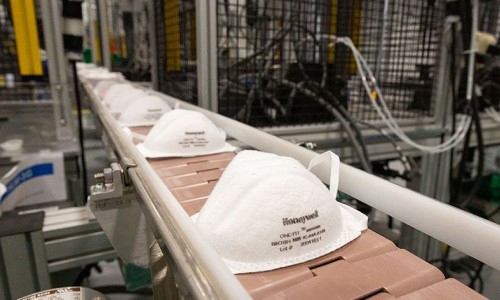Honeywell Factory Now Producing N95 Masks for Healthcare Workers
Honeywell was able to convert its Rhode Island factory in only five weeks — something that typically takes about nine months.

(Image Credit: Honeywell)
SMITHFIELD, R.I. — By now you are probably well aware that it is pretty much impossible to find N95 masks. Quickly snatched up by regular consumers once coronavirus fears began to settle in, these masks are in high-demand by healthcare workers.
In an effort to help combat the spread of the new coronavirus, COVID-19, Honeywell has configured its manufacturing plant here, which typically makes safety glasses and face shields, to also produce N95 masks.
The setup usually takes about nine months, but was completed in five weeks to meet the urgent need of frontline workers during the coronavirus outbreak, according to a Honeywell podcast.
“Honeywell is proud of the role we are playing in providing critical equipment for the fight against the coronavirus, and I am especially pleased with how quickly we have started our new mask production line in Rhode Island,” says Darius Adamczyk, Honeywell chairman and chief executive officer.
Honeywell says the masks will be delivered to the U.S. Department of Health and Human Services for the Strategic National Stockpile to support health, safety and emergency response workers.
Manufacturing of N95 masks will also begin at an aerospace facility in Phoenix in mid-May. Once both sites are fully operational, they will produce more than 20 million masks per month, according to the company. The two new lines will create more than 1,000 jobs in the U.S.
To support the fight against COVID-19, Honeywell is also increasing production of other personal protective equipment (PPE), including safety eyewear and face shields. It also makes sensors used in ventilators and is providing testing services to ventilator manufacturers.
Why Are N95 Masks So Important?
There is a major difference between N95 masks and a regular surgical mask. N95 masks provide respiratory protection and “reduce the wearer’s exposure to airborne particles, from small particle aerosols to large droplets,” according to the Centers for Disease Control and Prevention (CDC) “N95 respirators are tight-fitting respirators that filter out at least 95% of particles in the air, including large and small particles.”
Honeywell has a helpful breakdown of how N95 masks work and what “N95” actually means. Here’s a brief explanation:
- N: This is a Respirator Rating Letter Class. It stands for “Non-Oil” meaning that if no oil-based particulates are present, then you can use the mask in the work environment. Other masks ratings are R (resistant to oil for 8 hours) and P (oil proof).
- 95: Masks ending in a 95, have a 95% efficiency. Masks ending in a 99 have a 99% efficiency. Masks ending in 100 are 99.97% efficient and that is the same as a HEPA quality filter.
- .3 microns: The masks filter out contaminants like dusts, mists and fumes. The minimum size of .3 microns of particulates and large droplets won’t pass through the barrier, according to the CDC.
This article originally ran on our sister site, Security Sales & Integration.
If you appreciated this article and want to receive more valuable industry content like this, click here to sign up for our FREE digital newsletters!
 Leading in Turbulent Times: Effective Campus Public Safety Leadership for the 21st Century
Leading in Turbulent Times: Effective Campus Public Safety Leadership for the 21st Century
This new webcast will discuss how campus public safety leaders can effectively incorporate Clery Act, Title IX, customer service, “helicopter” parents, emergency notification, town-gown relationships, brand management, Greek Life, student recruitment, faculty, and more into their roles and develop the necessary skills to successfully lead their departments. Register today to attend this free webcast!







